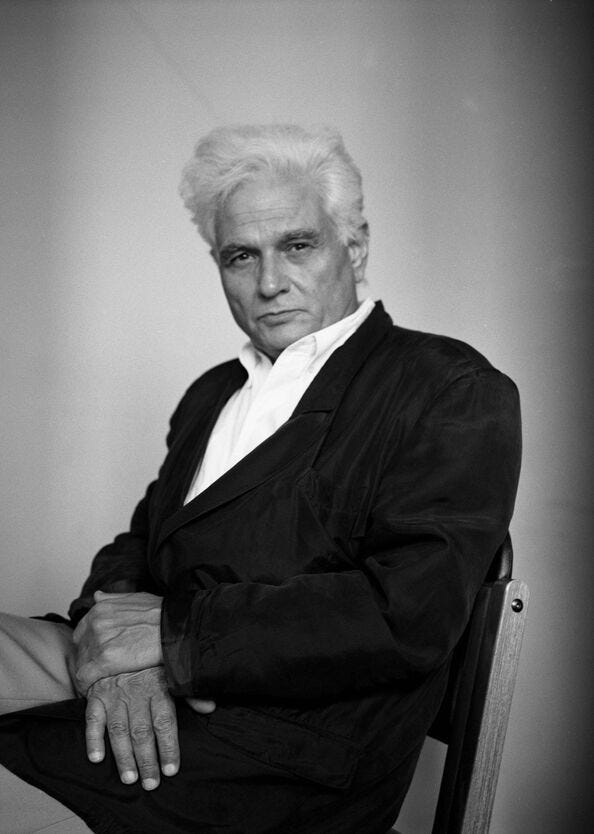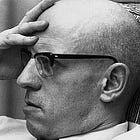Derrida and the Question of Language: Deconstruction in Linguistics
Rethinking Meaning, Writing, and Structure Through Derrida's Philosophy
I would like to thank
for suggesting this article.Who Was Jacques Derrida?
Jacques Derrida (1930–2004) was a French philosopher most closely associated with the movement known as deconstruction. Born in Algeria during French colonial rule, he became a towering figure in twentieth-century continental philosophy. Often placed alongside Michel Foucault and Jean-François Lyotard in the post-structuralist tradition, Derrida's work was both influential and controversial, especially in Anglo-American contexts.
Derrida's approach to language grew from his critique of structuralism and his engagement with figures like Saussure, Husserl, and Heidegger. For Derrida, language is not a neutral medium for expressing thought. It is a system riven with internal tensions, exclusions, and contradictions. Meaning is never fixed; it is always deferred. This has significant consequences for linguistics, especially when it comes to understanding how meaning is produced, interpreted, and destabilised.
Derrida vs Saussure: Writing, Presence, and Phonocentrism
In Of Grammatology (1967), Derrida critiques Ferdinand de Saussure's structuralist linguistics, particularly Saussure's claim that writing is merely a secondary representation of speech. Derrida calls this assumption "phonocentrism", that is the privileging of speech over writing as the true bearer of meaning.
For Derrida, this bias overlooks the ways in which writing reveals the fundamental operations of language. Writing, in his expanded sense, is not limited to alphabetical marks but refers to the broader concept of trace and différance. It exposes how all language, including speech, relies on absence and deferral. In opposing the idea that speech is more "natural" or immediate, Derrida challenges the foundations of Western metaphysics and structuralist linguistics alike.
Différance: Meaning as Deferral and Difference
Perhaps Derrida's most famous concept is différance. He coined the term by altering the French word différence (difference) with an "a" that cannot be heard, only read. Différance gestures at two ideas simultaneously: meaning is made through difference (as Saussure argued), but also through deferral. A word never fully contains its meaning; it points to other words, which point to others, and so on.
For linguists, this presents a challenge. Traditional semantic theories often seek stable meanings. Derrida argues that such stability is an illusion. Language is a chain of signs with no ultimate anchor. As a result, interpretation is always provisional and context-dependent. This idea finds a natural application in pragmatics and translation theory, where ambiguity, polysemy, and cultural context shape communication.
Deconstruction and Linguistic Structure
Deconstruction is not a method but a practice of reading that attends to the internal contradictions of a text. In the context of linguistics, deconstruction questions the binary oppositions that structure much linguistic thought: signifier/signified, langue/parole, competence/performance. Derrida does not reject these binaries outright but shows how they depend on exclusions and hierarchies.
Take, for instance, the signifier/signified distinction. In structuralist theory, the signified (the concept a word refers to) is often treated as primary, while the signifier (the sound or written mark) is seen as secondary. Derrida problematises this hierarchy. He argues that the signified is not a pure or stable essence that exists independently; rather, it is constituted through a network of signifiers. Each signified, then, is already shaped by other signs. This undermines the idea of an unmediated or fixed meaning.

A similar logic applies to the opposition between speech and writing. Traditionally, speech has been seen as the original, living expression of thought, while writing is viewed as a secondary or even corrupting supplement. Derrida reverses this order of value by showing that writing reveals something fundamental about language: its reliance on absence, repetition, and spacing. Writing, rather than being derivative, makes visible the deferred nature of all signification.
In the langue/parole binary, which distinguishes the abstract system of language from its concrete use in speech, structuralists have tended to prioritise langue as the stable foundation of linguistic analysis. Derrida counters this by highlighting the fluidity and instability found in actual usage (la parole). Far from being noise or variation, parole disrupts the fixity of langue, exposing the dependency of the system on its supposed marginal counterpart. The binary is thus shown to be unstable, with each term relying on the other to make sense.
Even the competence/performance opposition, made famous by Noam Chomsky, does not escape Derrida's critique. Competence refers to the idealised knowledge of language, while performance refers to actual language use, including errors, hesitations, and context-dependent variations. Derrida would argue that this distinction, too, is built on a hierarchical logic that masks the instability of its own foundations. Actual use (performance) cannot be dismissed as imperfect noise; it constantly reshapes what we take competence to mean.
Binary oppositions in linguistic theory often rest on philosophical assumptions about origin, purity, and hierarchy. Derrida’s project is not to discard these binaries, but to show how they are internally unstable. Each term in the pair contaminates the other, making it impossible to maintain strict separations. Deconstruction, in this sense, is a way of revealing how language resists the rigid structures imposed upon it, inviting us to think differently about meaning, structure, and communication.
Derrida's Influence Beyond Philosophy
Derrida's impact on linguistics is indirect but far-reaching. His ideas have influenced discourse analysis by highlighting the instability of meaning and the role of power in shaping language use. In translation studies, his insights have been central to debates about untranslatability and the impossibility of perfect equivalence. In critical applied linguistics, Derrida's thinking has been used to question the supposed neutrality of linguistic categories and educational practices. Literary linguistics, too, draws on deconstruction to unsettle ideas of textual unity and authorial intention.
He has also influenced feminist, postcolonial, and queer theorists who draw on language as a site of contestation and resistance. These scholars have used deconstruction to examine how dominant discourses marginalise alternative identities and reinforce social hierarchies. For example, feminist theorists have explored how language encodes gender norms and exclusions, while postcolonial thinkers have applied Derrida's critique of Western metaphysics to challenge Eurocentric assumptions in language and literature. Queer theorists, similarly, have drawn on Derrida’s work to interrogate the binaries of heterosexual/homosexual and normative/deviant, showing how such oppositions are discursively constructed and destabilised.
Still, Derrida has been met with resistance among linguists. Many regard his work as opaque or overly abstract. Others find little practical value in a philosophy that refuses definitive conclusions. But this criticism may miss the point. Derrida does not offer tools for analysis in the usual sense. He offers a way of thinking that questions the desire for finality, clarity, and control in linguistic theory.
Linguists Should Read Derrida
For those trained in linguistic science, Derrida may seem like a provocateur rather than a fellow analyst. But his critique of presence, his interrogation of binary structures, and his insistence on the instability of meaning have opened up productive lines of questioning. Derrida helps expose the philosophical scaffolding behind linguistic concepts and invites us to examine our assumptions.
His work reminds us that language is not a tool we use but a structure that shapes us. It is not transparent, neutral, or stable. It is full of tensions, gaps, and play.
Next, I am turning my attention to Michel Foucault, focusing on his work on discourse, knowledge, and power, and how these ideas have influenced sociolinguistics and discourse studies.
©Antoine Decressac — 2025.
As an Amazon Associate, I earn from qualifying purchases.
Derrida, J. (1976). Of Grammatology. Motilal Banarsidass Publications; New edition (1 Oct. 2002) — This foundational text introduces Derrida’s critique of phonocentrism and sets out many of his key ideas on writing, differance, and the structure of language.
Norris, C. (2002). Deconstruction: Theory and Practice. Routledge. — A clear and accessible overview of deconstruction and its implications for philosophy, literature, and linguistics.
Royle, N. (2003). Jacques Derrida. Routledge. — A concise introduction to Derrida's thought, suitable for readers new to his work but wanting more than a surface-level account.
Lucy, N. (2004). A Derrida Dictionary. Wiley-Blackwell. — A helpful reference for navigating Derrida’s complex terminology, with short entries and explanations.




A wonderful piece, friend. Derrida has influenced me plentifully, and I can say you have captured some of the main themes and direction of his philosophy very, very well. If you were ever curious, Derrida has a lot of other books that are hardly talked about as well but that are always worth reading. There is no thinker like him.
Looking forward to your Foucault piece. You're hitting the nail on the head for some of my favorite kinds of philosophers of the 20th century—and your writing is as thoughtful as it commands respect. Thank you very much.
Thanks for shining some light through the opacity